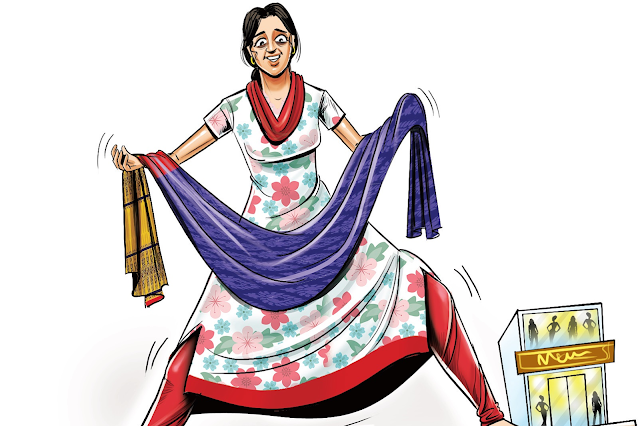These women can't seem to catch a break!
Kerala is often referred to as the ‘most literate and progressive’ State, right? Oh, wait! The National Human Rights Commission has issued a notice to their Government’s Department of Labour to notify how women employees in the textile retail business were denied their basic rights like ‘right to sit’ and ‘right to go on toilet breaks’. Following the complaint filed by a Mumbai-based lawyer, I take stock of the situation at some of the leading textile showrooms in Chennai.
Every day, Aruna (21) comes to work at 9 am and leaves by 10.30 pm. She stands for a minimum of 11 hours, attending to her customers. Midway, she barely rests for an hour (including her lunch break). “The eight of us are paid to just stand and receive customers; we take turns to do it. It has been two years since I joined. At first, I found it tough, but now I’m used to it. I make Rs 8,000 a month and send Rs 6,500 to my parents in Tiruvannamalai. I’m responsible for running my house,” she says.
And the toughest part? “I stay in Pallavaram and after Swathi’s murder, I am scared to take mofussil trains. It’s pitch dark when I get off and walk home,” she laments. So, how does she manage her expenses with just Rs 1,500 a month? “We get paid double for working Sundays. Yeah, it’s extremely difficult and hurts to be paid so little. I fell in love in Class 10, eloped and married a person who suddenly left. I failed to make the right decision and am now paying for it. Had I taken my education seriously, I wouldn’t have to stand like this,” she says.
The air was dusty and she didn’t even wear a mask. Coughing continuously, Rani (18) joins the conversation. “I lost my father when I was in Class 5. To help my mother and three sisters, I didn’t have a choice but to work here. I failed in math and didn’t want to continue my education. My teachers used to yell at me and call me ‘good for nothing’. If we had stayed in our villages, we wouldn’t have had an opportunity to step out of our home. Here, they give us food and accommodation, and get to dress up decently. We also interact with a lot of people. I feel happy and satisfied,” she explains.
Suddenly, her eyes wander. “I’m looking for the floor manager. I’m not supposed to talk to you without his permission. Surveillance cameras monitor us all day. If the pain is unbearable, we sit by the staircase,” she adds.
Media personality-turned-lawyer Sanjay Pinto points out that employees aren’t slaves. “A work environment must be conducive. It should have humane conditions and not resemble a concentration camp. Even prisoners are entitled to basic conditions under the prison manual. At a time when our lawmakers are considering nine months of maternity leave, flexible career options and menstrual leave every month, such reports, if true, seem like a foxtrot,” he explains.
In addition to labour laws, eight hours of work, overtime allowances and so on, every employee has a fundamental right to life and personal liberty under Article 21 of the Constitution. “This includes the right to a decent livelihood. Article 42 provides for just and humane conditions of work,” he adds. Many employees who toil long hours, in an attempt to support their families, don’t actually realise the health hazards of doing so.
“These women have high chances of developing varicose veins that commonly affect legs and ankles,” says Dr Madhav Vasudevan. “This happens because the blood seeps back into the vein instead of heading up to the heart. Eventually, valves in the veins weaken, causing itching, swelling, cramps, ulcers and even serious blood clots. Extreme cases need surgery.”
However, on visiting other textile outlets and a few jewellery showrooms, I learnt the procedure to take leave, receive benefits and the scale of pay differs. While their monthly salary varies between Rs 9,000 and Rs 11,000, some get to take four days off a month, others get two, while the rest go by ‘mutual’ convenience.
Geetha, who has been working at a jewellery store for five years, says, “We don’t have to stand all the time to receive customers at the entrance. It’s only for a couple of hours — between 6 pm and 8 pm. We can sit whenever we need to — but not for long. The management is flexible and understanding. We are permitted to take two days off each month, but not on Saturdays, Sundays and other holidays, as that’s when we get the most customers.”
However, she adds, “We’re like family. We share jokes, our family problems and happiness! And, time just flies. We’re given perks and allowances, too. The starting salary is Rs 10,000 and based on the experience, it keeps rising.” A customer chips in, “It looks like the management primarily employs unmarried women. So, the girls are given a small quantity of food and they don’t put on weight.”
*All names changed
(The piece was originally written for The New Indian Express)



Comments
Post a Comment